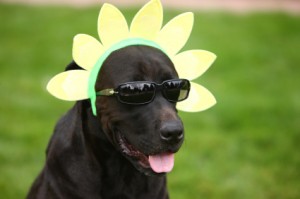Dementia affects old dogs in the same way it affects some older people with declining brain function.
Signs of dementia:
- Disorientation: staring into space, getting lost in the house or yard, getting stuck in corners or under furniture, standing at the wrong door to go out
- Reduced interaction with human family members: not greeting owners or seeking attention, following people around the house or losing interest in household events
- Loss of house-training: urinating or defecating in the house, not using the doggie door or not asking to go out to toilet
- Erratic sleeping behaviour: waking, pacing or vocalizing at night, sleeping less at night and more during the day
- Loss of learned behaviours
- Slow and cautious gait
 An aged dog exhibiting at least one of these signs more than once a week for at least a month has dementia.
An aged dog exhibiting at least one of these signs more than once a week for at least a month has dementia.
Dogs showing any signs are often severely affected within 12-18 months.
Treatment
- Diet:
Anti-oxidants delay and treat dementia. Antioxidants include Vitamin E, Vitamin C, Alpha-lipoic acid, L-carnitine and beta-carotene. Fruits and vegetables contain many of these.
Omega 3 fatty acids as found in fish oil or food supplements such as Nutricoat also help.
Hills b/d (brain diet) is a prescription diet that contains these nutrients.
- Physical therapy:
Stimulate brain function and delay the onset of dementia with basic obedience training, scent discrimination tasks, safety-modified obstacle courses and hide and seek games.
Gentle walks or swimming delay loss of brain function as well as improve muscle function.
- Environmental enrichment
Petting, brushing and massage stimulate the nerves and brains of old dogs. New toys, blinking lights, walks in new areas with new smells, and meeting new animals and people boost an old dog’s brain function and enjoyment of life.
